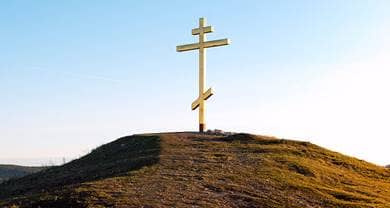- Trending:
- Pope Leo Xiv
- |
- Israel
- |
- Trump
- |
- Social Justice
- |
- Peace
- |
- Love

RELIGION LIBRARY
Eastern Orthodoxy
Afterlife and Salvation
This article clarifies some special characteristics of Eastern Orthodox belief regarding salvation, though the Orthodox also share common Christian beliefs about salvation and the afterlife. The Eastern Orthodox tradition speaks of salvation as deification, or theosis.
Salvation begins with the incarnation, in which God became human. God incarnated as Jesus was both true God and true man. He had two natures, not separate from each other, and not confused with each other. The crucifixion was God's loving act to break down the barrier of sin between God and humanity. The vast majority of Christians, including Eastern Orthodox Christians, agree on this teaching. But Orthodox Christians, when thinking about the crucifixion, do not tend to emphasize the suffering humanity of Jesus, or encourage feelings of anguish over his pain and suffering. Eastern Orthodox Christians tend to emphasize the suffering God in the crucifixion. In their prayers and hymns, the stress is placed on adoration of the glorious and triumphant King on the cross.
For Orthodox Christians, salvation means deification. Just as the Father, Son, and Holy Spirit dwell in one another in a constant movement of reciprocal love, so are humans, made in the image and likeness of the Holy Trinity, called to dwell in that same Trinitarian movement of love. The Gospel of John emphasized the hope that humanity would dwell together in communion with God, for example in the prayer attributed to Jesus in John 17:21, "that all of them may be one, Father, just as you are in me and I am in you." Paul's epistles repeatedly return to the theme of life "in Christ," and 2 Peter 1:4 goes to the heart of the matter by assuring Christians that they may "participate in the divine nature."
Participation in the divine nature does not mean becoming divine, however. Humans, when deified, remain distinct from God while in communion with the Trinity. The fundamental nature of the human does not change, but remains human. Participation in the divine nature means union with God's energies, not God's nature. Deification means to partake in the divine nature by God's grace, not by humanity's achievement or right.
According to the Orthodox, our body is deified as well as our soul, but the full deification of body and soul doesn't take place until the Last Day, which is the day of judgment and resurrection. On that day, Christians believe, the righteous will rise from the dead and receive their spiritual body. All the resurrected saints will be experience the restoration of God's likeness when they are transfigured just as Christ's body was transfigured by the divine light. In fact, Eastern Orthodoxy looks forward to a cosmic redemption in which the whole of material creation will be transfigured, as Romans 8:21 promises that "creation itself will be liberated from its bondage to decay and brought into the glorious freedom of the children of God."
Until the Last Day, all humans can potentially display signs of a spiritual communion with the Holy Trinity. The belief in theosis might sound unattainable, or reserved for only a specially chosen few, but this salvation is freely available to all people. The Orthodox understanding of theosis is consistent with the practical, grounded nature of Orthodox traditions and practice. All that is needed is to go to church, receive the sacraments regularly, pray, read the Gospels, and follow the commandments. Everyone who sincerely tries will to some degree succeed.
Study Questions:
1. How is salvation intrinsically bound to Jesus?
2. Describe the relationship between salvation and deification.
3. How is cosmic redemption an important part of Eastern Orthodoxy’s understanding of salvation?










